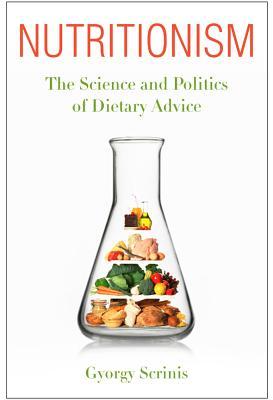As I reviewed 2013 on Goodreads, I realized I read fewer foodie books than normal, possibly because I was getting tired of the standard foodie-memoir format: gal at a crossroads in life goes somewhere else and finds herself through cooking, food, and some kind of romance. Insert [Name], insert [Exotic Place], insert [Recipes too Complex for the Reader to Bother With], insert [Foreign Boyfriend's Name], insert Implied Happily Ever After (even though the writer is only in her thirties). It's like Memoir Mad Libs. If this formula is new to you, and you would like to read such a book, just ask at the bookstore and they can direct you to shelves of them.
But in the meantime, I have collected five food- and/or environment-related books that I learned much from and enjoyed, in hopes that you or a loved one with similar interests might like to find one under the tree this Christmas.
In no particular order:
1. Nutritionism by Gyorgy Scrinis.
It's put out by a university press, so it can veer a little academic, but I highlighted this book like crazy. Basically, Scrinis argues against viewing foods as nutritional delivery systems, to be tweaked according to the latest fads. (I'm looking at you, eggs with added omega-3s.) First of all, eating
food is not the same thing as taking a supplement of the targeted
nutrient. No one exactly knows how food interacts holistically with
other foods and with the body to do that voodoo that food does so well. Of
far more interest and importance in Scrinis' eyes is the amount of
processing a food undergoes--many high-tech ingredients and processing
methods have not been studied for their effects. They just don't happen
to be illegal, so in they go. Think of the delightful trans fats we all
ate plenty of for years until someone figured out they're not so great.
Scrinis says the jury is still out on the new ways of processing fats
that manufacturers developed. The new fats aren't trans fats, but
they're not fats found in nature, either. That's just one example. Just
about everything food-related comes in for scrutiny: the latest diets
(--Cough!--no-carb and Paleo), the glycemic index, food
labeling, Michael Pollan arguing in circles, you name it. A fascinating, recommended read.
2. Speaking of Michael Pollan, I really enjoyed his latest
A
long, at times meandering hymn to the wonders of cooking processes that
few people have experience with anymore, from wood-roasting pork
(barbecue), to braises, to bread baking from wild yeasts, to fermenting
just about everything. As an everyday cook I was still amazed how much I
learned, and how many modern crutches I continue to use (e.g.,
commercial yeast). I'm dying to try my own sourdough starter now and to
pickle something, although both processes sound mind-bogglingly involved
and time-consuming.
No idea why this book has drawn criticism
where it has--Pollan in no place says women should get back in the
kitchen. Certainly few people--male or female--have the time or
perseverance to attempt mastering the skills Pollan writes about, but
many, like me, might pick one or two experiments to try.
Worth the read.
3. For the foodies in your life who are also history buffs:
A
quick, interesting read for Jefferson fans and foodies alike. How his
years in Paris and traveling in France and northern Italy influenced
both the man and the national cuisine. The dealings with James Hemings,
Jefferson's slave and legally-unrecognized brother-in-law also
fascinate. Don't look for much of sister Sally here, though.
4. And then there are the lovers of all things artisanal:
A foray into the ultra high-end world of bespoke clothing.
Author Noonan hunts down vicuña shearers in Peru and fabric weavers in the
Brontes' old stomping grounds of Yorkshire. There are passages on Beau Brummell and
buttons and how hard it is to find an apprentice nowadays. After you read this, you'll be trolling the vintage clothing stores, looking for natural materials and lost craftsmanship.
5. Finally, for the environmentalist in your life (a Venn diagram of Marketgoers and environmentalists would probably show a distinct overlap):
This
was one excellent book. Informative, fascinating, alternately
depressing and hopeful. As a culture we are being buried in
trash--especially plastic and food waste. Humes follows the history of
waste "disposal" without righteous hand-wringing or drama. The situation
is dramatic enough and the conclusions obvious without all that.
I
came away considering a plastic fast in our family--using and recycling
the last of the plastic wrap and existing bags and containers, but
trying, trying, trying to minimize/eliminate them after that. Just about
everything is made of plastic or comes in single-use, disposable
packaging, so I don't even know if it's possible unless you go whole-hog
like the families that write the Zero-Waste books.
A lovely, cleansing read for the post-Christmas hangover that is the month of January.
That's the UrbanFarmJunkie's reading year in review. Hope you find something here to share!
Subscribe to:
Post Comments (Atom)






No comments:
Post a Comment
Note: Only a member of this blog may post a comment.